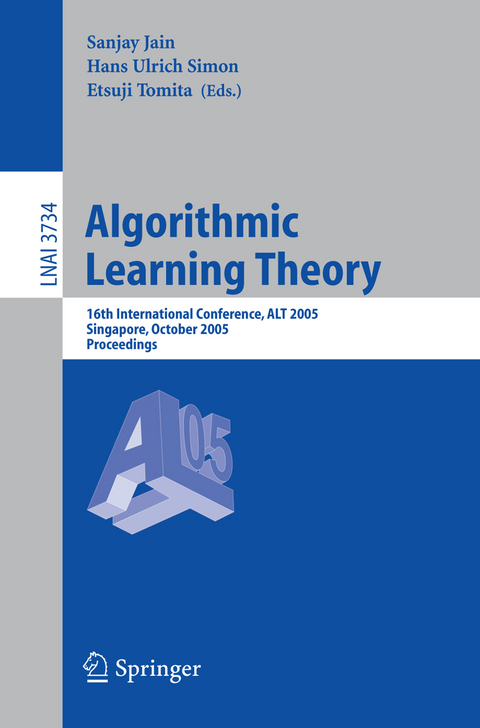
Algorithmic Learning Theory
Springer Berlin (Verlag)
978-3-540-29242-5 (ISBN)
Editors' Introduction.- Editors' Introduction.- Invited Papers.- Invention and Artificial Intelligence.- The Arrowsmith Project: 2005 Status Report.- The Robot Scientist Project.- Algorithms and Software for Collaborative Discovery from Autonomous, Semantically Heterogeneous, Distributed Information Sources.- Training Support Vector Machines via SMO-Type Decomposition Methods.- Kernel-Based Learning.- Measuring Statistical Dependence with Hilbert-Schmidt Norms.- An Analysis of the Anti-learning Phenomenon for the Class Symmetric Polyhedron.- Learning Causal Structures Based on Markov Equivalence Class.- Stochastic Complexity for Mixture of Exponential Families in Variational Bayes.- ACME: An Associative Classifier Based on Maximum Entropy Principle.- Constructing Multiclass Learners from Binary Learners: A Simple Black-Box Analysis of the Generalization Errors.- On Computability of Pattern Recognition Problems.- PAC-Learnability of Probabilistic Deterministic Finite State Automata in Terms of Variation Distance.- Learnability of Probabilistic Automata via Oracles.- Learning Attribute-Efficiently with Corrupt Oracles.- Learning DNF by Statistical and Proper Distance Queries Under the Uniform Distribution.- Learning of Elementary Formal Systems with Two Clauses Using Queries.- Gold-Style and Query Learning Under Various Constraints on the Target Class.- Non U-Shaped Vacillatory and Team Learning.- Learning Multiple Languages in Groups.- Inferring Unions of the Pattern Languages by the Most Fitting Covers.- Identification in the Limit of Substitutable Context-Free Languages.- Algorithms for Learning Regular Expressions.- A Class of Prolog Programs with Non-linear Outputs Inferable from Positive Data.- Absolute Versus Probabilistic Classification in a Logical Setting.-Online Allocation with Risk Information.- Defensive Universal Learning with Experts.- On Following the Perturbed Leader in the Bandit Setting.- Mixture of Vector Experts.- On-line Learning with Delayed Label Feedback.- Monotone Conditional Complexity Bounds on Future Prediction Errors.- Non-asymptotic Calibration and Resolution.- Defensive Prediction with Expert Advice.- Defensive Forecasting for Linear Protocols.- Teaching Learners with Restricted Mind Changes.
| Erscheint lt. Verlag | 26.9.2005 |
|---|---|
| Reihe/Serie | Lecture Notes in Artificial Intelligence | Lecture Notes in Computer Science |
| Zusatzinfo | XII, 491 p. |
| Verlagsort | Berlin |
| Sprache | englisch |
| Maße | 155 x 235 mm |
| Gewicht | 708 g |
| Themenwelt | Informatik ► Theorie / Studium ► Algorithmen |
| Informatik ► Theorie / Studium ► Künstliche Intelligenz / Robotik | |
| Schlagworte | Algorithm analysis and problem complexity • Algorithmic Learning • algorithms • Artificial Intelligence • Automata • autonom • classification • Complexity • Computational Learning • Forecasting • Heuristics • Inductive Inference • Inductive Logic Programming • kernel-based learning • Learning Algorithms • machine learning • Online Learning • PAC learning • query learning • Statistical Learning • Support Vector Machine • Support Vector Machines |
| ISBN-10 | 3-540-29242-X / 354029242X |
| ISBN-13 | 978-3-540-29242-5 / 9783540292425 |
| Zustand | Neuware |
| Haben Sie eine Frage zum Produkt? |
aus dem Bereich


